City guides


Richmond Travel Guide
The stately Southern grand dame of Richmond has been Virginia's state capital since 1780. Although a bastion of history, it also has all the hallmarks of a lively and modern urban centre, acting as an ideal gateway to the rest of the state. A range of attractions is within easy reach and visitors can enjoy the neighbouring sights and sounds of the ocean, mountains, historic colonial Williamsburg or even drive into Washington DC to visit the nation's capital.
Richmond has played an enormous role in American history, particularly as the capital of the Confederacy during the Civil War. Today, visitors can discover a host of monuments, battlefields and museums harking back to the days when Jefferson Davis and Robert E. Lee held out against the Union.
But this isn't a city stuck in the past and there are numerous modern attractions including an active nightlife, plenty of restaurants and outdoor concerts. Strolls along the attractive Canal Walk and the restored Haxall and Kanawha Canals are a great way to relax. There's also the option of catching a boat, with some tours including an historical narration, or there you can simply hire a car and get around by yourself.l
The cityscape is an interesting combination of modern high rise office complexes housing financial institutions, Fortune 500 Companies, government offices, hospitals and universities, and the more charming cobblestone, gas-lit streets flanked by 19th-century warehouses, and a 300-year old farmers' market, filled with the scent of ripe fruit and fresh flowers.
Things to do in Richmond
The capital of Virginia, Richmond is not only rich in American history, but is also a modern urban space where visitors will find something to suit every taste.
In terms of history, Richmond certainly delivers. Home to some incredible museums and historical sites, such as St John's Episcopal Church, The American Civil War Museum and the Virginia Museum of History and Culture, those with an interest in the American Revolution and the Civil War will be very happy here. The State Capitol is a favourite with visitors.
For those with less interest in history and more in the arts, the Virginia Museum of Fine Arts houses a world-class collection of classical American and European sculptures and paintings. Visitors will also enjoy the River District where trendy restaurants can be found occupying century-old warehouses and bands entertain crowds on the lawns of Brown's Island. For lovers of science and the more left-brain thinkers among tourists, the Science Museum of Virginia will not disappoint.
Whatever their interests, there is something to keep all visitors to Richmond entertained and those travelling with kids will find the city very family-friendly.
Capitol Square
Richmond's Capitol Square is an oasis of old trees, statues and green lawns perched on a hilltop in the heart of the downtown area. The magnificent centrepiece is the neoclassical State Capitol building, designed by Thomas Jefferson, which has been in continuous use since 1788. In its rotunda stands a life-sized statue of George Washington, Virginia's most treasured artwork. The Governor's Mansion, home of Virginia governors since 1813, has been restored and contains its original woodwork, plaster cornices and ornamental ceilings, while other historic buildings in the square include the old Bell Tower, dating from 1824 and the neoclassical Old Finance Building.

Museum and White House of the Confederacy
Civil War buffs flock to the Museum of the Confederacy, which houses the most comprehensive collection of Confederate artefacts, personal memorabilia, and art to be found anywhere in the United States. The exhibits include artworks, 550 battle flags and 215 uniforms, including those of well-known officers. Beside the museum is the White House of the Confederacy. Tours are available of the 1818 mansion in which Confederate President Jefferson Davis and his family lived during the Civil War, and the property is still furnished with original items.
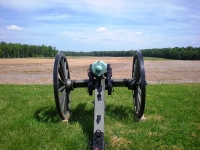
Richmond National Battlefield Park
Union armies repeatedly set out to capture Richmond, strategic capital of the Confederacy, and end the Civil War. Three of those campaigns came within a few miles of the city. The park commemorates 13 different sites associated with those campaigns, including the battlefields at Gaines' Mill, Malvern Hill and Cold Harbor. In 1865, President Abraham Lincoln made a historic visit to the battlefields of Richmond days before his assassination, urging an end to the war. Established in 1936, the park protects 763 acres (308 ha) of historic ground. There are roughly seven miles (11.2km) of well-maintained walking trails around the battlefields.
Virginia Museum of Fine Arts
Richmond boasts an exceptional Fine Arts Museum, which presents a panorama of world art from ancient to modern, including the largest public Faberge imperial Easter egg collection outside of Russia, consisting of roughly 150 jewel-encrusted creations made for Tsars Alexander III and Nicholas II. The Museum is also home to a collection of English silver, one of the world's leading collections of the art of India, Nepal and Tibet, and six Gobelin Don Quixote tapestries.
St John's Episcopal Church
St John's Church has stood on Richmond Hill above the James River since 1741, and is known for having been the venue for the second Virginia Convention in 1775, attended by George Washington and other historic personalities. The church is also where legendary Pocahontas was baptised and married to John Rolfe. The wooden building is still home to its original pulpit and some exquisite stained-glass windows. Between May and September, living history performances are given every Sunday recreating the historic Second Virginia Convention. Informative tours explore the historic significance of the church building and grounds.
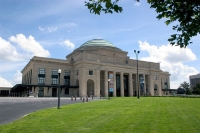
Virginia Science Museum
The hands-on Virginia Science Museum allows visitors to touch, observe and explore the impact of science on their lives, covering everything from astronomy to computers to flight engineering. Live demonstrations are given daily on each level. Level One has programmes aimed at younger children, while the demonstrations on Levels Two and Three include animal dissections. Other special events are held regularly, with schedules available on the website. The fascinating and fun museum is complemented by The Dome, which at 76 feet (23m) is the largest screen in Virginia. It's 45-minute features cover everything from the Amazon rainforest to astronomy.
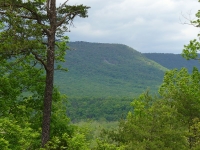
Shenandoah National Park
Following the Blue Ridge Mountains for 100 miles (161km) through western Virginia, the Shenandoah National Park is a nature reserve where tens of thousands of animals, including deer and black bears, roam among richly forested slopes. More than 500 miles (800km) of hiking trails snake through the area from the azalea-trimmed Skyline Drive, the 105-mile (169km) long road that runs through the park from the Piedmont Plateau, providing wonderful vistas of the Shenandoah Valley from its overlooks. A free event called Wildflower Weekend is celebrated in May and will appeal to lovers of wild flowers and nature-themed art, and ranger-led tours and programmes are offered between April and October. There are also special activities for kids.
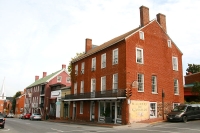
Lexington
The sedate town of Lexington, 138 miles (222km) west of Richmond in the Shenandoah Valley, contains one of the most picturesque downtown areas of old buildings in America. Tourists visit the town simply for its ambience, and perhaps to pay tribute to Civil War General Robert E. Lee, who was eventually buried in Lexington along with his famous horse, Traveller. There are many fun outdoor activities and attractions in Lexington, with scenic routes such as the Appalachian Waters Scenic Byway, Blue Ridge Parkway and Rockbridge Rides. Geocaching, hiking, canoeing, horseback riding and golf are all popular activities, while local orchards, wineries, breweries and coffee roasteries also offer tastings in the scenic greater Lexington region.
Mount Vernon
One of Virginia's most popular tourist attractions and the highlight of any historical Virginia tour is the colonial estate of George Washington, Mount Vernon. Since its private purchase in 1858, it's been restored and kept as a historic monument. Consisting of 500 acres (202ha) situated on the Potomac River, the gardens, mansion and other buildings are open to the public, and costumed employees demonstrate life in the 18th century. Visitors can even tour Washington's Tomb, which holds ceremonial wreath-layings at 10am and 2pm. In 2007, Mount Vernon was given permission to reopen Washington's distillery, which now produces its own whiskey. The estate also offers cruises on the Potomac River.
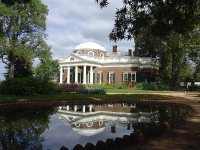
Monticello
Monticello was the estate of Thomas Jefferson, third president of the United States and author of the Declaration of Independence. The distinctive neoclassical building of the main house was designed by Jefferson himself, furnished with a blend of original and replica pieces. Jefferson's time at Monticello is surrounded by controversy regarding his treatment of his slaves. Monticello has several multimedia exhibitions that deal frankly with the president's slave ownership. The outbuildings and gardens are all open to the public, and offer some stunning sights with beautifully cultivated flower gardens. The gardens are also home to the Center for Historic Plants, a project started by Jefferson himself.
Getting Around
The Greater Richmond Transit Company (GRTC) runs the public bus system that serves the Richmond metropolitan area. The bus routes access most of the major cultural attractions in Richmond and are therefore useful for tourists. Richmond is well supplied with taxi companies, with cab ranks outside most major hotels, the airport, Amtrak and the Greyhound terminal; ride-hailing apps such as Uber and Lyft are available.
The city also offers plenty of walking tours and is relatively compact and easy to negotiate on foot. It is worth hiring a car to explore the outlying regions, but not entirely necessary if staying in town, traffic is usually fairly light and parking relatively easy to find which makes driving in Richmond a pleasure.
Richmond Climate and Weather
Richmond has a humid subtropical climate, with hot, humid summers and mild winters. Late May heralds the start of warm summer days, and the peak summer months between June and August can be very hot and humid, with temperatures ranging between 65F (18C) and 100F (38C). Some relief from the summer heat is provided by rain showers, with July the wettest month of the year. Days stay warm to mild through to October, when autumn is marked by nights once again becoming chilly. December and January are the coldest winter months, with temperatures ranging between 28F (-2C) and 51F (11C). Light snowfalls occur from the end of November, but most snow falls in January.
United States of America travel info
Electricity
The electrical current is 120 volts, 60Hz. Plugs are mainly the type with two flat pins, though three-pin plugs (two flat parallel pins and a rounded pin) are also widely used. European appliances without dual-voltage capabilities will require an adapter.
Language
English is the most common language spoken but Spanish is often heard in the south-western states.
Money
The official currency is the US Dollar (USD), which is divided into 100 cents. Only major banks exchange foreign currency. ATMs are widespread and credit cards are widely accepted; Apple Pay and Google Pay are very popular. Banking hours are Monday to Friday 9am to 3pm.
Tipping
A 15 percent tip is expected by taxi drivers, bartenders, hairdressers and waiters, but travellers shouldn't tip in fast-food or self-service restaurants. In expensive restaurants or for large parties, the tip should be 20 percent of the bill. It's normal to tip staff such as valets and porters in hotels; this is discretionary, although a minimum of $5 is expected. Most services are customarily tipped if the service is good.
Health
There are no specific health risks associated with travel within the USA. Medical facilities are excellent, but expensive. Only emergencies are treated without prior payment and treatment can be refused without evidence of insurance or proof of funds. Good medical insurance is essential.
Safety
Travel within the United States is generally trouble-free, though travellers should be aware that the US shares with the rest of the world an increased threat from terrorist incidents. Security has been heightened, particularly at airports. Restrictions on hand luggage apply and travellers are advised to check on the latest situation with airlines in advance. Travellers should also be alert to the dangers of car and street crime in cities and should use common sense and take basic precautions. Hurricanes are common between June and November, putting the southern USA, including the Gulf Coast and the eastern US at risk. There's a risk of wildfires in many dry areas in the US, particularly on the West Coast from March to November.
Local customs
Laws vary from state to state, including speed limit, fines and punishment. The age at which alcohol may be legally bought and consumed is 21 years.
Doing business
In such a large country, filled with so many diverse groups, business practices may differ according to each state, though rarely to any large degree. The East Coast is traditionally more formal than the West Coast, though in states such as California, dress code and conservative appearance are as common as they would be in New York. Punctuality is important throughout the country and it's considered rude to be late for a meeting. Gift-giving is uncommon as it may be construed as bribery. Appropriate titles (Mr, Mrs, Ms) are used upon introduction and until otherwise stated. Americans favour politeness and greetings of 'Hello' and 'How are you?' are often expressed with sincerity. Business hours may vary in each state, but an 8am start and 5pm finish Monday to Friday is the most common with an hour over lunch.
Status and age are not necessarily indicative of seniority, nor do they carry much weight in themselves. Those doing business in the States should be mindful of this fact; foreigners should never make assumptions about someone's position or rank. Best practice is to be respectful to all parties. That said, the US upholds a hierarchal business structure in which 'the boss' is the ultimate decision-maker. Senior leaders have the power of the last word, and can go against the grain just as easily as they can follow popular opinion. Foreigners should concentrate on winning over this individual, even if the greater group seems unsupportive. Americans value a direct style of communication. In this fast-paced, consumer culture 'time is money', and small-talk is viewed as unnecessary and wasteful. It's best for foreigners to get to the point quickly, speak about issues in a frank and open manner, and to avoid taking offence if someone questions or challenges them outright.
Duty free
Travellers to the United States who are returning residents of the country do not have to pay duty on articles purchased abroad to the value of $800 provided their stay was longer than 48 hours and their duty-free allowance was not used in the 30-day period prior. For passengers arriving from Samoa, Guam and the U.S. Virgin Islands, a duty-free allowance of $1,600 is allowed. The following items are included in this: 50 cigarettes and 10 cigars and 150 millilitres (5 fl. oz.) of alcoholic beverages or 150 millilitres (5 fl. oz.) of perfume containing alcohol. Restrictions may apply to goods from Cuba, Iran, North Korea, Burma (Myanmar), Angola, Liberia and Sudan. It is prohibited to import Cuban cigars from any country.
Travellers to the United States who are non-residents do not have to pay duty on the following items: 50 cigars or 200 cigarettes and gifts to the value of $100 provided their stay in the USA is not less than 72 hours and that the allowance has not been used in the preceding six-month period.
Prohibited items for residents and non-residents include meat or meat products, poultry, narcotics, absinthe, plants, seeds, vegetables, fruits, soil, live insects and other living plants or animal pests. Fish is prohibited unless it carries disease-free certification. Wildlife and animals or their by-products carry restrictions. Dairy products and eggs from specified countries are not allowed. Firearms and ammunition are not allowed without the necessary license and permit.
Communications
The international country dialling code for the United States is +1. Mobile networks cover most of the country, especially all urban areas; travellers can purchase local prepaid SIM cards for unlocked phones or use eSIMs if their cellular providers support it on their networks. WiFi is widely available.
Passport & Visa
It is highly recommended that travellers' passports have at least six months' validity remaining after the intended date of departure from them travel destination. A visa is required for short visits unless travellers qualify for entry under the Visa Waiver Program.
The Visa Waiver Program (VWP) enables citizens of certain countries to travel to the US for a stay of up to 90 days without a visa. Visitors under the VWP need a valid Electronic System for Travel Authorization (ESTA), which allows the US government to screen all visitors before travel. Visitors entering the country under the VWP must have a machine-readable passport (MRP) that has a barcode on the photo page. Travellers under the VWP must have passports that include biometrics if they wish to enter the country without a visa, which means that passports must contain unique personal data such as fingerprints or iris details. All passports must contain a digital photo image in order to travel visa-free. All visitors to the USA have a photograph and two fingerprints taken by an inkless scanner on arrival, including those travelling visa-free under the VWP.
As part of the Western Hemisphere Travel Initiative (WHTI), all travellers travelling between the United States and Canada, Mexico, Bermuda, and the Caribbean region are required to present a passport or other valid travel document to enter or re-enter the United States. If departing from the USA, a valid passport is required by immigration authorities. Immigration officials often apply different rules to those stated by travel agents and official sources.
Entry requirements
US citizens require passports.
UK nationals require a passport valid for duration of stay. Most passport holders can get an Electronic System for Travel Authorisation (ESTA) through the Visa Waiver Programme, which allows travel to the US for up to 90 days. The VWP includes tourism, certain types of business visit and transit to another country.
The most important requirement on entering the U.S. is providing proof of Canadian citizenship. A valid Canadian passport is the best document to prove Canadian citizenship and the right to return to Canada. However, several other documents can serve, depending on the mode of transport. Generally, Canadian citizens do not require visitor, business, transit or other visas to enter the United States from Canada, though there are some exceptions.
Passports must be valid for the period of intended stay. If visiting the US for fewer than 90 days, Australian nationals may be eligible to apply for an Electronic System for Travel Authorization (ESTA), and enter under the Visa Waiver Program (VWP).
South Africans must hold a passport valid for duration of stay. A visa is required.
Passports must be valid for duration of stay. Irish nationals can get an Electronic System for Travel Authorisation (ESTA) under the Visa Waiver Programme for entry into the United States.
Passports must be valid for duration of stay. New Zealand nationals can get an Electronic System for Travel Authorisation (ESTA) under the Visa Waiver Programme for entry into the United States.
Useful contacts
United States Tourist Office: www.usatourist.com
911 (General)Embassies / consulates in other countries
United States Embassy, London, United Kingdom: +44 20 7499 9000.
United States Embassy, Ottawa, Canada: +1 613 688 5335.
United States Embassy, Canberra, Australia: +61 2 6214 5600.
United States Embassy, Pretoria, South Africa: +27 12 431 4000.
United States Embassy, Dublin, Ireland: +353 1 668 8777.
United States Embassy, Wellington, New Zealand: +64 4 462 6000.
Embassies / consulates in United States of America
British Embassy, Washington DC: +1 202 588 6500.
Canadian Embassy, Washington DC: +1 202 682 1740.
Australian Embassy, Washington DC: +1 202 797 3000.
South African Embassy, Washington DC: +1 202 232 4400.
Irish Embassy, Washington DC: +1 202 462 3939.
New Zealand Embassy, Washington DC: +1 202 328 4800.


